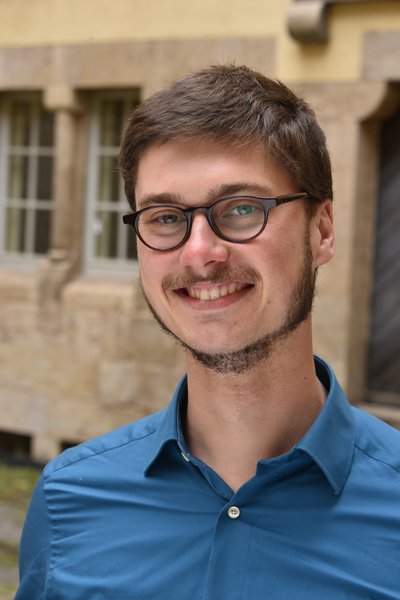Adrian Mehner
PhD candidate - 1st cohort
Classical Philology/ Latin

Research project
Avianus – Studies on his Pre-Texts and their Processing
Probably around 400 AD, the Roman author Avian composed a work consisting of 42 fables written in elegiac distichs. He thus followed the ancient poets Phaedrus and Babrios, who also made their works consist exclusively of versified fables - the one in Latin Senares, the other in Greek Choljambs.
The assumption of this thesis is that Avian consciously became dependent on his two predecessors and thus adopted traits both in content and form from them. In his Prose Praefatio, he explicitly names Phaedrus and Babrios as predecessors alongside Aesop, Socrates and Horace.
Avian's fable corpus can therefore be placed in the context of the Autonomy of heteronomous texts in many ways. There is a particular dependence on the fables of Babrios. By expanding as well as updating some of his texts, he undertakes an interpretation and explanation of them. It is thus not only a Collectio of ancient fables, but also a Commentarius and a Renarratio of Greek fables in Latin. Here, Avian's work is heteronomous to that of Babrios in terms of content, but it also breaks away from it in the sense of an Aemulatio. Formally, Avian's fables also seem to be dependent on Phaedrus' work, which corresponds to the rhetorical-compositional ideal of the Augustan poets. In a sense, Avian follows this ideal in imitation of Phaedrus.
Furthermore, Avian's separation from his models is an essential part of this thesis. Not only the selection and rearrangement, but also the use of such fables, whose models are completely unknown to us today, if they did not even come from Avian himself, are characteristics of his work.
After a methodical introduction that combines literary-compositional and fable-specific aspects, this thesis will open up a formal-aesthetic perspective on Avian's work, show its dependence as well as its novelty compared to its predecessors and thus expand our picture of the late antique fabulist.
Curriculum Vitae
2014 – General qualification for university entrance at Philipp-Melanchthon-Gymnasium Gerstungen
2021 – First state examination for the teaching profession in the subjects Latin and History at the Friedrich Schiller University Jena
04/2019 - 12/2022 – Research assistant at the Institute of Classical Studies at the Friedrich Schiller University Jena
01/2022 - 02/2023 – Teacher of the subjects Latin, History and Mathematics at the Evangelische Gemeinschaftsschule Erfurt
Seit 01/2023 – Colleague of the DFG Research Group 2792 "Autonomie heteronomer Texte in Antike und Mittelalter" at the Friedrich Schiller University Jena